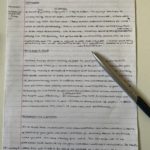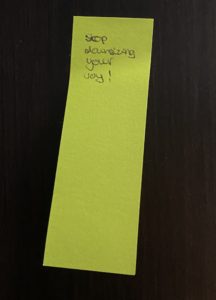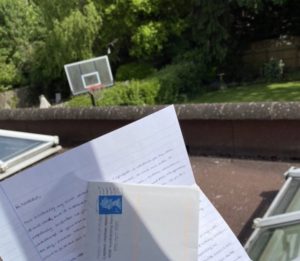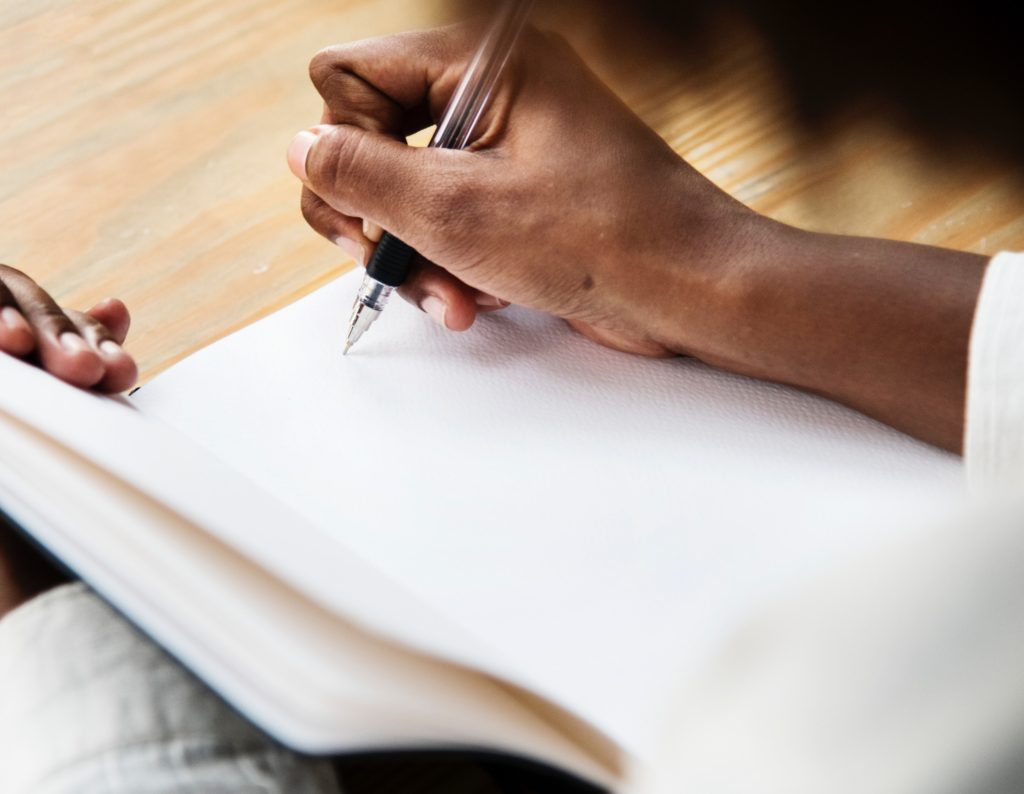Some people think that using pen and paper is outdated. I beg to differ.

I’ve been writing a lot recently, with me starting a blog and all. But I’ve tried to maintain some balance between electronic writing and handwriting. My blog has been a great creative outlet. But there are some other ways I like to harness my writing in a more personal way.
I’ve always been a fan of writing things down on paper. I usually handwrite my meeting minutes, write down notes during class or duplicate my electronic to-do list. Back in the day, I even handwrote out my revision notes for every GCSE exam I took. Even though most days I’m pretty much glued to my laptop for my day job (and I pick up my phone to check emails/messages one time too many), journaling, note-taking and re-writing my to-do list on paper will always be a part of my day-to-day.
On top of my Apple Notes on my iPhone, I keep several different physical notebooks: an #IamRemarkable achievements log (a Google initiative I am a facilitator for), my Happiness Planner (my journal), a journal for my favourite Bible verses and Christian affirmations, as well as my standard notebook(s) for work. Some people may find this shocking, but I can’t help it. One of my work colleagues who saw me holding a pen on a Teams video call said he hadn’t seen or used a physical pen in months. There is a trade-off when using written rather than electronic forms of writing, but handwriting comes with its own superpowers.
As well as talking through some of these in this post, I’m going to try something new and completely draft this post on paper (see below). I’ve also included a few challenges along the way to see if I can convince you that pen and paper is the combination to beat. Read on to find out how my post turned out.

Handwriting aids memory
It can’t only be me that remembers things I wrote down more easily than something I have typed. The physical act of writing provides an element of processing that aids memory and learning. The nature of handwriting means that you have to organise and interpret your thoughts as you are writing. This leads to deeper processing of information that will aid memory later on.
You also engage certain aspects of your brain and have to use more of your motor skills, as writing requires more dexterity than typing. There are also fewer distractions helping you to increase your focus. I haven’t heard of anyone being interrupted by a ping from a piece of paper.
There is definitely a reason why our teachers told us to write things down. Although typing gives us speed, writing gives us deeper processing. A 2014 study looked at the note-taking of US college students during a lecture using pen and paper versus using a laptop. Students taking handwritten notes performed better than those who typed. Although they were able to take fewer notes, they synthesised this information better.
Challenge 1: Try and recall the last thing that you wrote vs. the last thing that you typed.
More powerful processing
Writing things down engages the full processing power of one’s subconscious. It also helps declutter your mind, by literally taking thoughts out of your head. This is a form of control, that is not as easily replicated through typing on a phone or other electronic device. Words on a page are a direct creation. They have an element of permanency that is missing from the electronic form.
Handwriting can help you think and articulate what’s going on in your head. The time spent writing information down gives you time to understand that information. Naturally, we are more careful with the written word which means we filter our thoughts more effectively.
Challenge 2: Summarise how you are feeling right now on a post-it note or scrap piece of paper. Reflect on the process of writing down your feelings.
Manifestation and motivation
It’s no secret that visualisation is powerful (side note – did anyone get that reference?). Manifestation can work wonders in terms of achieving your goals. You are 42% more likely to achieve your goals if you write them down. Writing down or drawing what you want can help clarify your thoughts and focus on what matters. If you speak things into existence, you can also write these things into existence.
You can also use the written word as motivation and stick it up on surfaces in various places to act as visual cues. I stick up post-it-notes on the side of my wardrobe with important notes as I can easily see them when I wake up. For my last few exams, which have an open book element, I’ve taken in motivational notes. These provide an exam-appropriate pep talk when I get thrown by a difficult exam question.

Yes, these words may not be as visually appealing as a cut-out from a magazine or carefully organised PowerPoint. However, they are much closer to your being than anything else. And if you have nice handwriting (like me) or are not artistically challenged (unlike me), you might prefer your scribbles to the photos you might normally select for a vision board exercise.
Challenge 3: Write down some motivational material in relation to your short-term goals and stick it somewhere visible in your bedroom. Reflect on your feelings when you see it.
Pen and paper is more personal
Words on a page are more personal than anything on a mobile/laptop/tablet screen. It’s so easy to Whatsapp your friends, but when was the last time you wrote them a letter. This may seem old-school, but I handwrote a few lockdown letters to a few friends in March and posted them. In a global pandemic, a surprise in the post might be the pick-me-up that someone you love needs. A handwritten letter is personal and demonstrates care and effort. There’s nothing more personal than your handwritten words, as no one else can really reproduce those.

These letters shared my appreciation of my friends and reflected on our shared memories. Writing the letters was uplifting for me, as the gratitude and happiness within them countered some of the lockdown lows I was facing. My friends appreciated the letters more than they’ve ever appreciated a text. They thought it was a nice surprise, despite us texting on a regular basis in the meantime. One of my friends who had been living alone during lockdown said she stuck up my letter on her wall. This shows that a handwritten letter is something the receiver is more likely to keep and treasure.
Challenge 4: Write a handwritten letter to someone in your friendship circle and send it to them in the post.
Conclusion
There you have it – a precis on why writing things down is elite. This was a fun mini-experiment for me. The words you just read were mainly written on paper with some minor adjustments to the structure, grammar and the addition of external references. Whilst writing, I definitely had to think a bit harder and write logically. It helped to have a paper plan and it didn’t even take me that long (1-2 hours tops). I’m sure I’ll try this again sometime.
Anyway, I hope I’ve convinced you to write some things down on paper and let the benefits flow. All it takes is the classic combination of a pen and a piece of paper.

